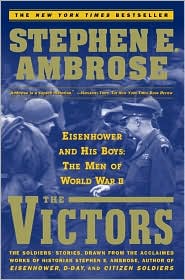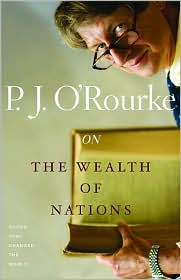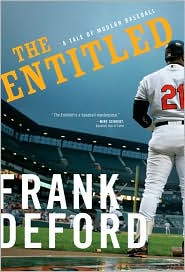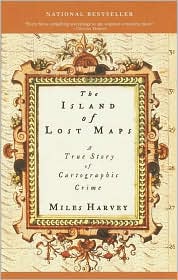I considered over 200 books for this list. And here they are in no particular order:
Huckleberry Finn, Silas Marner, Fahrenheit 451, The Grapes of Wrath, 1984, Animal Farm, Apropos of Nothing (series), Knight Life (series), Tom Sawyer, Neuromancer, The Alchemist, The Moon is a Harsh Mistress, Turners and Burners, Freakonomics, God's Smuggler, Plainsong, If Chins Could Kill, Resurrection, Inc., Fierce Invalids Home From Hot Climates, My Family and Other Animals, Last Days of Summer, Test Pattern, Going Postal, A Bevy of Beasts, Birds Beasts and Relatives, Gods and Generals, Fat Man in a Middle Seat, Understanding Arabs, The County of Monte Cristo, The Hitchhiker's Guide to the Galaxy (series), The Killer Angels, I Rode with Stonewall, Faith of My Fathers, Nixon off The Record, Memoirs of a Geisha, Rebel Private Front and Rear, Congo: From Leopold to Kabila, Colin Powell: My American Journey, Do Androids Dream of Electric Sheep, The Picture of Dorian Gray, Get Shorty, Cold Mountain, The Framing of the Constitution, Founding Brothers, The 15 Biggest Lies in Politics, Stephen King On Writing, The Amazing Kavalier and Clay, The Mysteries of Pittsburgh, Wonder Boys, The Right Stuff, Rocket Boys, Stranger in a Strange Land, Big Trouble, Palace Walk, Night of the Avenging Blowfish, The Peoples Choice, Frankenstein, Double Whammy, Complete & Utter Failure, Tourist Season, Collapse, Emergency Sex, Straight Man, Good Omens, Basket Case, The White House Mess, The Sound of waves, The Mother Tongue, The Supreme Court, Goodnight Nebraska, Miracle at Philadelphia, Portrait of an Artist as an Old Man, Naked Came the Manatee, Savannah, Some Kind of Paradise, The Real World Order, The Westing Game, A Man in Full, Bonfire of the Vanities, American Hero, Harry Potter (series), Absurdistan, Skin Tight, Good as Gold, God Knows, Be Cool, Pattern Recognition, Stormy Weather, The World According to Garp, A Prayer for Owen Meany, Lucky You, Pronto, Riding the Rap, The Man who Invented Florida, Condominium, Something Happened, Bandits, Sick Puppy, The Cannibal Queen, Hammerhead Ranch Motel, Florida Roadkill, Home from Nowhere, Picture This, On the Road, Snow Crash, River of Grass, The Prophet and the Messiah, From Bauhaus to Our House, Star-Spangled Men, The Road To Nowhere, No-Fault Politics, Napoleon Bonaparte Broward, Inside the White House, A Court Divided, This New Ocean, The Big U, Party Politics: The American Decay, It Looks Like a President Only Smaller, The Death of Common Sense, The Tortilla Curtain, A History of Post-Colonial Lusophone Africa, The Patriot, The Road to Wellville, Divided we Fall, The Nine Nations of North America, The Wrong Stuff (Moore), Liftoff, What it Takes, Runaway Jury, Skipping Christmas, The Firm, The Pelican Brief, To Kill a Mockingbird, Back to the Moon, East is East, The Osterman Weekend, The Diamond Age, The Bourne Trilogy (series), The Road to Gandolfo, The Road to Omaha, The Chronicles of Narnia (series), Salmon Fishing in the Yemen, Life of Pi, Lit Life, Chariots for Apollo, Catch-22, Little Green Men, Sphere, Jurassic Park, Lost World, The Andromeda Strain, I Am Charlotte Simmons, Deke, Bartram's Trail Revisited, Notes from a Small Island, A Walk in the Woods, Lost Cosmonaut, The Sex Lives of Cannibals, The Gods Drink Whiskey, Together Alone, An Embarrassment of Mangoes, Whatever You Do Don't Run, Facing the Congo, The Lost Continent, The Overloaded Ark, As I Lay Dying, Charlie and the Chocolate Factory, A Connecticut Yankee in King Arthur's Court, Heart of Darkness, The Secret Garden, Lord of the Flies, The Hotel New Hampshire, The Cider House Rules, Native Tongue, Alice in Wonderland, The Great Gatsby, A Farewell to Arms, Understanding Iraq, The Scarlatti Inheritence, The Rhinemann Exchange, The Gemini Contenders, The Chancellor Manuscript, The Aquitaine Progression, The Icarus Agenda, The Water-Method Man, Breakfast of Champions, Dirk Gently's Holistic Detective Agency, The Martian Chronicles, The Scarlet Letter, A Separate Peace, The Odyssey, The Jungle, The Fountainhead, The Catcher in the Rye, Ethan Frome, A Gathering of Old Men, The Time Machine, Alas Babylon, On Liberty, The Prince, A Man on the Moon, John Adams
And now, without further ado, let me present
The Smitty Library Top 24 Books1. Straight Man - Richard Russo
2. The Right Stuff - Tom Wolfe
3. Snow Crash - Neal Stephenson
4. A Man on the Moon - Andrew Chaikin
5. Emergency Sex - Cain, Postlewait, Thomson
6. Picture This - Joseph Heller
7. Harry Potter (series) - J.K. Rowling
8. Wonder Boys - Michael Chabon
9. The Hitchhiker's Guide to the Galaxy (series) - Douglas Adams
10. Huckleberry Finn - Mark Twain
11. The Tortilla Curtain - T.C. Boyle
12. Catch-22 - Joseph Heller
13. On Liberty - John Stuart Mill
14. A Walk in the Woods - Bill Bryson
15. Life of Pi - Yann Martel
16. The Count of Monte Cristo - Alexandre Dumas
17. The Cider House Rules - John Irving
18. The Moon is a Harsh Mistress - Robert A. Heinlein
19. Collapse - Jared Diamond
20. The Lion, the Witch, and the Wardrobe - C.S. Lewis
21. The Death of Common Sense - Philip K. Howard
22. Heart of Darkness - Philip Conrad
23. My Family and Other Animals - Gerald Durrell
24. On the Road - Jack Kerouac
 Over the last week I slogged through The Victors, by Stephen E. Ambrose. Slogged is the wrong word, though, because it was actually a good read. Not always easy. Books about war never are. I could write thousands of words about this book. I think we're in danger of forgetting what it used to mean that we lived in America, what it was that differentiated this place from others. I can't see the spirit of World War II in our present conflicts; maybe it's because of our distinctly unenlightened leadership. Whatever it is, reading this book makes clear the difference in time frames; when we went out to fight an evil enemy in WWII, the nation as a whole sacrificed, especially those who went to fight. When we set out to fight the present evil enemy... the nation as a whole was told to go shopping. A sort of review follows the jump.
Over the last week I slogged through The Victors, by Stephen E. Ambrose. Slogged is the wrong word, though, because it was actually a good read. Not always easy. Books about war never are. I could write thousands of words about this book. I think we're in danger of forgetting what it used to mean that we lived in America, what it was that differentiated this place from others. I can't see the spirit of World War II in our present conflicts; maybe it's because of our distinctly unenlightened leadership. Whatever it is, reading this book makes clear the difference in time frames; when we went out to fight an evil enemy in WWII, the nation as a whole sacrificed, especially those who went to fight. When we set out to fight the present evil enemy... the nation as a whole was told to go shopping. A sort of review follows the jump.


